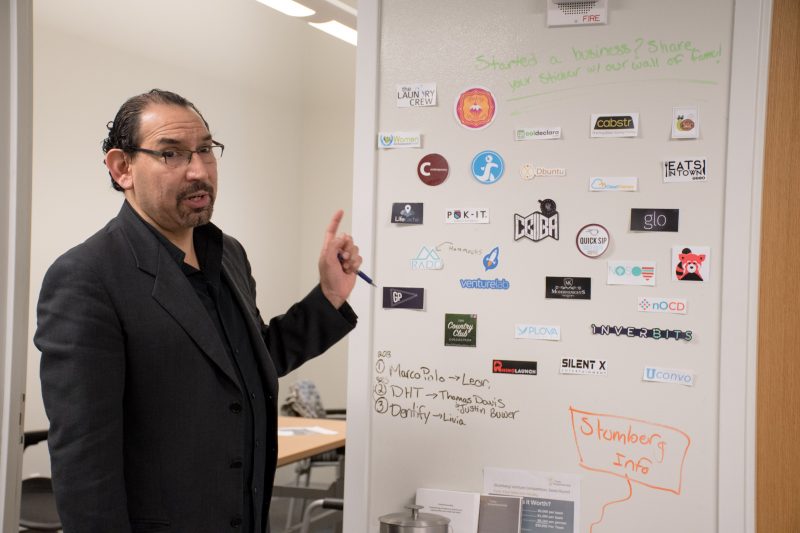According to Article O Section 3 of the student handbook, students are not allowed to sell merchandise, products or services on campus. However, the university permits students affiliated with the entrepreneurship department to run businesses despite this policy.
Generally, students who are looking to start businesses on campus can work with the entrepreneurship department and the university to make this possible.
“We encourage students who are interested in establishing businesses to do so, but it’s nice if they’re working under our umbrella because we can help steer them from directions which are clear violations of policy, and we can steer them in the direction where they are clear to operate,” said Luis Martínez, director of entrepreneurship. “We’re the easy one-stop center for trying to see where students are clear to operate.”
There are some restrictions on what students can and cannot sell on campus. For example, students who wish to sell food could encounter legal obstacles with Aramark, Trinity’s dining service that has the rights of selling food on campus. In addition, there are laws and safety regulations in the state of Texas surrounding food sales.
An entrepreneurial venture launched by Trinity students in 2013, The Unlawful Waffle, once ran afoul of these rules. During a brief time, a group of students sold waffles in Beze Underground, and this business violated campus rules about selling food.
However, students who want to sell food may be able to do so if they meet with the entrepreneurship department and comply with university rules.
“Our job — if you come to us and say, ‘We want to operate a food service business,’ — we can guide them to what those regulatory requirements are and where they’re free to operate or not free to operate,” Martínez said.
This is also true for door-to-door sales, which are discouraged in the handbook but can be negotiated if students reach out to the different departments, like entrepreneurship and Residential Life.
In recent years, the entrepreneurship department has shifted towards encouraging students to start businesses while on campus, most of which are startups.
Matthew Munroe, a senior entrepreneurship student, explained the difference between student startups and businesses.
“A startup is not necessarily a company — it’s something that works to become a company. So a lot of time it’s just ideas, some people have products, some people have revenue, some people just have a logo,” Munroe said. “So it’s not necessarily students selling stuff to students on campus, it’s students creating a company, or a startup that is trying to become a company.”
Students are free to sell items online, with caveats regarding what can be sold online legally. Sophomore Alexandra Parris wrote about her online crocheting sales in an email interview.
“My business isn’t really a business, per se! I make art, and sometimes people ask me to make them things, and I ask for some kind of compensation,” Parris wrote. “I’ve made less than $100 from my crocheting, and for me, it’s more about making the actual art than selling it. I’m just a girl who happens to have crocheted items sitting around my room sometimes.”
Not all students who sell items online would define themselves as having a ‘business.’ However, students who want to start companies online or enhance their online revenue can contact the entrepreneurship department for assistance and guidance.
“We want students who say, ‘I’m selling stuff online.’ Great! That’s where we come in. Are you charging sales tax? Are you paying a franchise tax? Do you have a sales tax certificate? There are all of these rules about selling online in the state of Texas,” Martínez said.
Trinity offers classes, such as Intro to Entrepreneurship — offered every semester — which can help students looking for entrepreneurial opportunities while at Trinity or in the future. Students don’t need to be enrolled in any entrepreneurship classes to ask for help in creating or managing a startup or business. For students interested, email [email protected].







